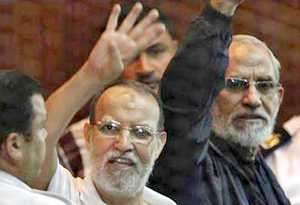Cairo, Sep 14: Qatar has asked seven senior figures from Egypt’s outlawed Muslim Brotherhood to leave the country, the movement said on Saturday, following months of pressure on the Gulf Arab state from its neighbors to stop backing the Islamists.
Ibrahim Munir, a senior Brotherhood official based in London, told Reuters the departures did not mean a rupture in ties between Qatar and the Brotherhood.
“The Qatari authorities told the Brotherhood they are facing pressure and circumstances would not allow the presence of all these Brotherhood figures in Doha,” he said by telephone, without elaborating.
Qatari officials were not immediately available for comment.
Qatar and Turkey were the only regional countries to back the Brotherhood after Egypt’s army toppled Islamist President Mohamed Mursi last year following mass protests against his rule.
Saudi Arabia, the United Arab Emirates (UAE) and other Gulf Arab states, in contrast, have showered Egypt’s new rulers with billions of dollars. They see the Muslim Brotherhood as an existential threat to the monarchies.
Tensions over Qatar’s support for the Brotherhood led Saudi Arabia, Bahrain and the UAE to withdraw their ambassadors from Doha in March.
“To lift the embarrassment for the state of Qatar, which we found hospitable, some of the symbols of the Muslim Brotherhood who have been asked to move their residency outside the state have agreed,” senior Brotherhood figure Amr Darrag said on his Facebook page.
Munir said Darrag was one of the Brotherhood members leaving Qatar, though Darrag did not specifically say so in his message.
Ties between Qatar and Egypt were badly damaged after Mursi’s fall. Doha has welcomed a number of senior Brotherhood figures since Egyptian security forces launched a crackdown on the movement, killing hundreds in the streets and arresting thousands of others.
Egypt has declared the Brotherhood a terrorist movement. The Brotherhood says it is a peaceful group.
The spokesman for Egypt’s foreign ministry said he had “no idea” if Qatar had expelled Brotherhood leaders, and declined to comment further until Cairo had examined the issue.
Kerry in Cairo
Qatar has also been courted by the United States to support US-led action against Islamic State militants who control parts of Iraq and Syria.
US Secretary of State John Kerry won backing on Thursday for a “coordinated military campaign” against Islamic State from 10 Arab countries — Egypt, Iraq, Jordan, Lebanon and six Gulf states including Saudi Arabia and Qatar.
Lebanese Foreign Minister Gebran Bassil told Reuters some Arab states at talks in Jeddah on Thursday had proposed expanding the campaign to fight other Islamist groups besides Islamic State.
That could include the Muslim Brotherhood, though Turkey would be expected to oppose this.
Kerry arrived in Cairo on Saturday for talks with senior government officials.
Egypt would certainly welcome any moves that would further isolate the Muslim Brotherhood, many of whose leaders are on trial in Cairo and could face the death penalty.
Wagdy Ghoneim, a cleric who supports the Muslim Brotherhood, said he was leaving Qatar.
“Thanks to Allah, I have decided to move from dear Qatar, not to cause any pressure or embarrassment or problems for my dear brothers in Qatar,” he said in a video on his Facebook page.





Comments
Add new comment